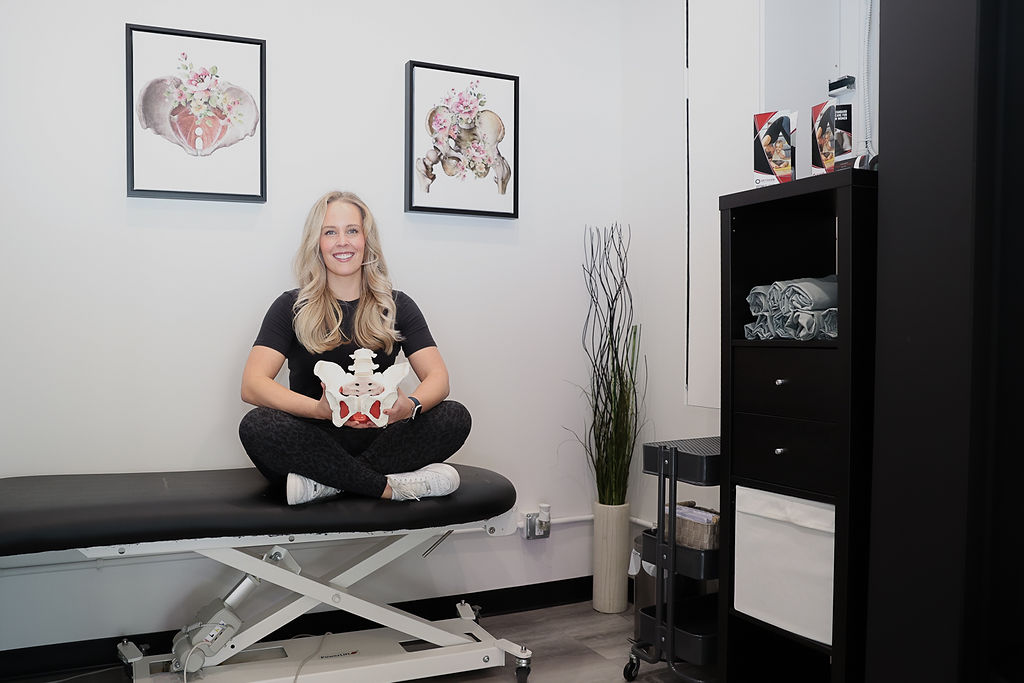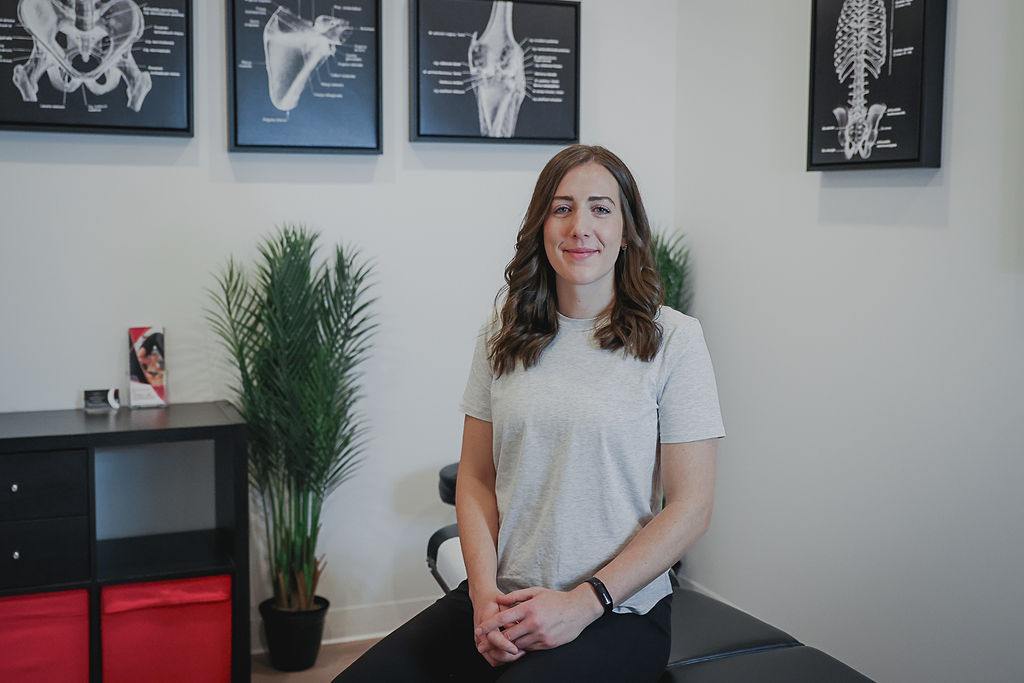Supporting Your Pregnancy and Postpartum Life
The Benefits of Pelvic Health Physiotherapy and Chiropractic Care
In recent years, there has been a growing interest in Pelvic Health among healthcare professionals, including Physiotherapists and Chiropractors, who are now dedicating more attention to this area of health to better support pregnant and postpartum patients.
At Optimize Physiotherapy, some of our practitioners are exploring new and innovative treatment options for women dealing with Pelvic Health concerns, focusing on pregnant women and new moms.
Real talk: Pregnancy causes many changes in a woman’s body over nine months. Some of these changes can significantly stress bones, muscles, and organs, leading to discomfort and pain in different parts of the body.
Although these changes are natural and necessary for your baby’s growth and development, they can also contribute to increased stress and anxiety levels, especially for first-time mothers.
In this blog post, we’ll discuss some common physical changes that occur during pregnancy and how to manage them effectively with Pelvic Health Physiotherapy and Chiropractic Care to ensure a healthy pregnancy and a positive experience for you and your baby.
And we haven’t forgotten about Postpartum! There are even more changes and challenges after your sweet baby has arrived, so we’re sharing some of the common concerns we see and treat in the clinic Postpartum.
Meet the Team

Before we get started, let’s introduce the Pelvic Health team at Optimize.
Courtney Von Wackerbarth is a Certified Internal Pelvic Floor Physiotherapist trained to rehabilitate the pelvic floor muscles.

In addition to being a Doctor of Chiropractic, Dr Gillian Altheim is a GrowCo Rehab Ambassador and holds a Certificate in Postnatal Rehabilitation. She is also certified in the Webster Technique.
Together, Courtney and Dr Gill our powerhouse Pelvic Health Team.
Okay, let’s kick things off with a few of the most common things we see with expectant moms in the clinic. Not every pregnant mom will encounter these issues, and every pregnancy is a bit different, but these are some of the typical concerns of our mamas-to-be:
- Back Pain and Discomfort: Due to changes in posture and weight distribution, back pain or discomfort may be experienced during pregnancy. This discomfort can make simple daily activities like walking, sitting, and sleeping extremely challenging, significantly impacting overall well-being.
- Pelvic Girdle Pain: Pelvic Girdle Pain is also quite common and can restrict mobility and cause discomfort for expectant mothers. It often occurs due to increased flexibility and changes in the pelvic alignment during pregnancy. If left untreated, it can significantly impact the overall well-being of the mom-to-be.
- Sciatica: During pregnancy, the sciatic nerve can experience added pressure, leading to discomfort and pain radiating down the legs, feet, and glutes. This type of pain can be debilitating and make it difficult to perform daily activities like walking and sitting.
- Postural Changes: As a baby grows, the body naturally adjusts to accommodate its increasing weight and size. This puts added pressure on the muscles and nerves that support a growing belly, possibly changing a woman’s posture. These natural postural changes can sometimes result in muscle strain and discomfort.
- Stress and Anxiety: Hormonal changes and anticipation of the baby’s arrival can often increase stress and anxiety levels. Waiting for the baby to arrive is an exciting time, but the uncertainty of what’s ahead can also contribute to feeling overwhelmed or nervous. All of this is entirely normal to feel. Still, it is essential to manage stress during all trimesters of pregnancy.
The Role of Physiotherapy and Chiropractic Care During Pregnancy
During this time, both Physiotherapy and Chiropractic care can be beneficial in addressing these concerns.
Dr. Gill uses diversified Chiropractic Care and the Webster technique to treat women throughout pregnancy. The Webster technique is a specific Chiropractic analysis and adjustment that reduces stress on the nervous system, promotes pelvic girdle balance, and reduces tension noted through ligaments and muscles. This helps to optimize a mother’s pelvic function during pregnancy and birth. Dr. Gill’s personalised approach targets physical discomfort and promotes emotional well-being, ensuring expectant mothers experience a more comfortable pregnancy.
Physiotherapy addresses these same prenatal health concerns using tailored exercises and techniques. In prenatal care, physiotherapy helps moms stay active, doing their favourite activities in a way that is safe and considerate for the pelvic floor and abdomen. Courtney works with you to modify your current activities, making them appropriate as your pregnancy progresses, and giving you confidence in what you’re doing through every stage of pregnancy. Preparing for labour and delivery is also part of Physiotherapy for pregnancy. Courtney may provide you with comfort measures, perineal massage, labour and delivery positioning, push prep, and postpartum care planning as part of your care plan.
After Baby Arrives
After the baby arrives, the body’s transformations continue in Postpartum. The Postpartum period has three phases, each with its unique characteristics. The first phase occurs 6-12 hours immediately following birth. The second is the 2-6 weeks after birth, and the third period can last upwards of 6+ months.
A few of the postpartum health concerns that we see in new moms during this time are:
- Diastasis Recti: Diastasis recti is a common adaptation that affects 99% of women past 35 week gestation. The abdominal muscles structurally evolve to stretch as the baby grows, as there is no room to expand towards the spine.
- Pelvic Floor Dysfunction: Pelvic floor issues are a common concern for new mothers postpartum. Pelvic Floor Dysfunction symptoms, such as incontinence and pelvic organ prolapse, can have a significant impact on your quality of life and daily activities. Shockingly, research shows that one in three women in Canada experiences some form of Pelvic Floor Dysfunction.
- C-section Recovery: A caesarean delivery (C-section) is a surgical procedure commonly performed these days. Although it is a routine operation, it is still a serious abdominal surgery that requires a careful recovery process. Recovering from a C-section can take a significant amount of time and patience. Post-operative pain, the formation of scar tissue, and the need for attentive recovery are some of the critical aspects that we prioritize when treating new moms who have undergone a C-section
Postpartum and Pelvic Health Physiotherapy
If you experience any of these symptoms, either during or after pregnancy, a Pelvic Health Physiotherapist can help. Typically, during a visit with Courtney, our Pelvic Health Physiotherapist, you’ll have a thorough discussion about your current issues in your body as well as your abdomen and pelvic floor. A biomechanical exam and treatment of the low back and hips may be indicated, but is not always performed at each visit.
The pelvic floor is usually assessed either internally or externally based on your symptoms, goals and comfort levels. Depending on your goals and main concerns, we focus the assessment and treatment there. Manual therapy is done as needed for the pelvic floor, abdomen, hips and low back, but the cornerstone of what Pelvic Health Physiotherapists do is individualised exercise prescription to address the cause and management of their symptoms.
Postpartum and Chiropractic Care
Exercise rehabilitation is also helpful in recovering from pregnancy and childbirth. Dr Gill is certified through GrowCo, a leader in postpartum care. GrowCo experts fill the gap in postpartum care by providing a comprehensive checkup and progressive healing through exercise, targeting the core, pelvic floor, and total body. Their methodology aims to prevent, reduce, or resolve symptoms women experience after childbirth.
Dr Gill has created a Postpartum Rehab class for new moms like you using this methodology. In this group class, you work through the four pillars of postpartum rehab:
- Breathwork
- Postural Protocol
- Core & Pelvic Floor Function & Strength
- Glute Strengthening
These classes aim to get you back to feeling more like yourself.
Dr Gill says, “Postpartum is forever, and it’s never too late to start, so even if it’s been five years since you had your baby, you’re welcome to join!”
Our Prenatal and Postpartum Team
As you venture into motherhood, it’s essential to prioritize your health and well-being throughout your pregnancy and beyond. With the unique challenges and concerns that come with it, it can be overwhelming to navigate it alone. That’s why our team is dedicated to supporting you every step of the way. From prenatal care to postpartum recovery, we’re here to provide you with the care you need to ensure a healthy and happy journey into motherhood.
On our Services page, you can learn more about Pelvic Health Physiotherapy with Courtney. Dr Gill’s upcoming Postpartum Rehab classes are listed in our Events section – check to see if one is coming soon!
You can also book an appointment online if you’re looking for support through your pregnancy and postpartum life.